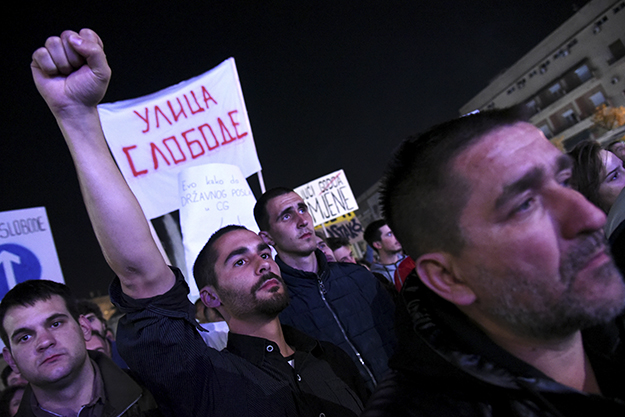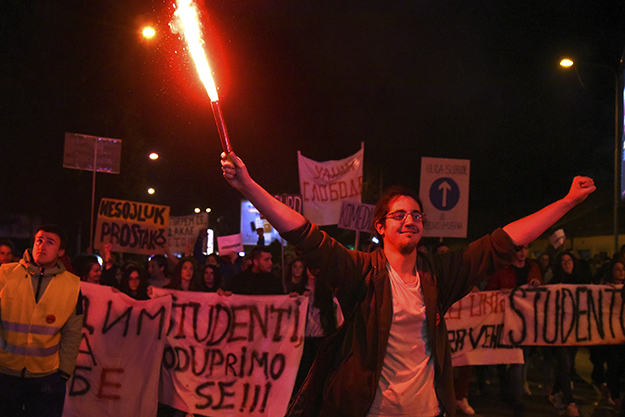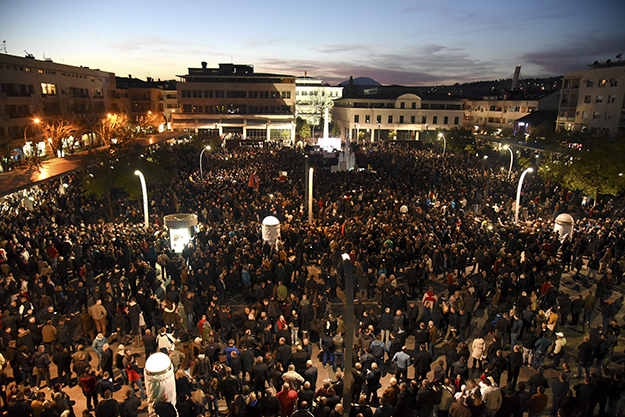Milo Đukanović, the current president of Montenegro, has dominated the country’s political scene, as prime minister or president, for the better part of 30 years. His position, however, is coming under sustained pressure as thousands of Montenegrins have for weeks been taking to the streets to protest against systematic corruption, as well as a lack of media freedoms and human rights.
Initiated by a group of citizens in mid-January, and supported by 39 opposition parties, the “most massive anti-government protests in Montenegro in recent years” — as the media has described them — have led to the public signing of an Agreement on the Future by leading activists and opposition MPs.
The agreement, signed on March 30 and comprising five points, is described by those who signed it as a political document that obliges opposition parties to jointly work on organizing “the first free and fair elections in the history of Montenegro.”
It requests the resignation of the president and prime minister, as well as that of the head of the prosecution and the directors of the Agency for Prevention of Corruption and the public broadcaster, Radio Television Montenegro (RTCG).
The ultimate goal of the protests, as the organizers have claimed, is “the liberation of the captured state”
The signatories have agreed to advocate for the establishment of a “government of civil unity,” limited in its term, which would work on creating the conditions for conducting fair and free elections. Protest organizers are describing the agreement as a “routemap for a peaceful transition of government.”
Every Saturday, protesters gather at Podgorica’s main square, showing various messages to the government: “We are the state,” “Shame on you,” “Thief Milo,” “Thank you for the sustainable ruins,” and “Resignations.”
Rich former friend
The protests that have been ongoing under the slogan “Resist — 97000” began as a reaction to the “envelope” affair, set in motion by Duško Knežević — “the escaped businessman,” as the pro-government Montenegrin media refers to him. The affair included the publishing of video and audio material, in which members of the elite have been caught in compromising situations indicative of corruption.
Although the affair set the protests into motion, organizers have communicated to Knežević that he should not attempt to co-opt the movement, but should remain a “repentant witness or insider.”
The tapes have increased suspicions with regard to the 2016 parliamentary elections in Montenegro and of the possibility that the composition of the current parliament could be a product of political corruption and secret financing.

Džemal Perović, one of the protest leaders, has been heading the demonstrations since day one. Photo: Boris Pejović / K2.0.
The ultimate goal of the protests, as the organizers have claimed, is “the liberation of the captured state” and the sacking of all those who are occupying leading offices, as a precondition for the establishment of a normal system.
“We have gathered to say that we are ashamed of their infamy while they rob, cheat, and sell us out,” said Džemal Perović, one of the protest leaders and a former MP of the Liberal Alliance of Montenegro, during one of the very first protests. “We want to tell the world and Europe, so they can feel our shame, so that they know that there are normal people out here.”
Knežević has published tapes via his Instagram account that have shaken the entire political and banking sectors.
President Milo Đukanović sent them a message by giving an interview to RTCG, stating that he would “most certainly not” resign and referring to the protests as “political, and not civic” in nature. He emphasized that the current affairs serve as the introduction of instability into Montenegrin society, “which would in the end result in a revolution.”
Controversial businessman Duško Knežević, president of the Atlas group, observes everything that is going on in Montenegro from a distance, from London; he has told the media that he will not come back while the current government is in power.
Over the course of two months, Knežević has published tapes via his Instagram account that have shaken the entire political and banking sectors. Above all, he damaged the image of the Central Bank of Montenegro (CBCG), by publishing a video in which the then vice-governor of the CBCG, Velibor Milošević, explains to him how to bribe CBCG inspectors who verify the legality of the bank’s operations.
Knežević is himself the owner of two banks — Atlas Bank and Invest Banka Montenegro (IBM) — both of which are in crisis and close to being shut down, and the decline of these banks was the trigger of his anger.
In one single envelope that he presented to the former mayor of Podgorica [...] he offered a 97,500 euro “donation” to the party.
In December 2018, the CBCG placed Atlas Bank and IBM under temporary administration, a decision reached based on a negative audit report that was made in 2017, but only published after the intervention.
The Central Bank’s decision came after a World Bank warning at the end of last year that defined the conditions for the state to get favorable loans. The World Bank requested supervision of problematic banks, including the two banks belonging to Knežević.
He claims that he published the series of tapes in order to provide to the public evidence that he believes shows numerous malversations and corrupt affairs, entangling top government officials and ruling Democratic Party of Socialists (DPS) members, as well as President Đukanović himself.

Every Saturday since mid-January, people from throughout Montenegro have been heading to Podgorica to join the largest protests in the modern history of the country. Photo: Boris Pejović / K2.0.
Knežević, who also holds British citizenship, is himself the subject of an investigation by the State Prosecutor’s Office of Montenegro, which suspects him of being the leader of a criminal group that laundered hundreds of millions of euros through his two banks. The Special State Prosecutor’s Office blocked 63 million euros connected with Atlas over alleged tax fraud through e-commerce banking, an accusation that was later changed to claims of money laundering. The investigation includes almost 180 legal entities and individuals.
In December last year, an Interpol red notice was issued against Knežević, which means that he should be provisionally arrested pending further legal action or potential extradition to the claiming country. However, it is unclear whether Britain would extradite its own citizen.
Until recently, Knežević was a close friend of Đukanović — and he claims to be one of the largest donors to his party, which has been in power for three decades.
It is uncertain whether he actually is the biggest donor. However, in one single envelope that he presented to the former mayor of Podgorica, Slavoljub Stijepović — prior to the 2016 parliamentary elections — he offered a 97,500 euro “donation” to the party.
This is what the public saw on one of the tapes that Knežević published when he decided to speak up, after issues arose concerning his business — and it is what led to the affair being dubbed “envelope,” while the protest movement carries the name “97000,” after the donation amount.
Stijepović is now an advisor to President Đukanović.
While the prosecution is conducting proceedings and issuing warrants targeting him, Knežević claims that he has yet to publish the most important tape. The still unpublished recording allegedly shows Đukanović himself taking money from him.
Establishing a business elite
Knežević accuses Đukanović and his brother Aco, the owner of Prva bank, of allegedly getting involved in his business in order to destroy it, and of freezing all businesses he established, from banks and related services to universities.
However, Đukanović himself denies that he ever was Knežević’s friend and claims that Knežević is doing everything in his power to burn down the Special Prosecution’s archive, hoping that a revolution will save him from being held accountable before the law. He categorically denies that Knežević owns any compromising material on him.

A large number of young people have been part of the protests on the streets of Podgorica, protesting against those who have been in power all their lives. Photo: Boris Pejović / K2.0.
According to economic analyst Mila Kasalica, the roots of all this go much deeper. Kasalica says that in order to understand this situation, it is necessary to be familiar with four phases that have marked the formation of the “business elite” on the soil of what has been popularly called the “Western Balkans,” including Montenegro.
The first phase — lasting from 1992 to 1995 — she says was characterized by the rise of a class of businesspeople who profited from their ties to politicians. The second phase constituted the dismantlement of the economic system, which was accompanied by the privatization process through which state-owned property was sold off to private actors in the wake of Yugoslavia’s collapse. This process regularly entailed a number of irregularities, and often resulted in the closure of factories and the dismissal of workers.
When the appearance of the banks “acting nicely” fell apart, the essence of the institutional wreck slowly came to light.
Just as in other countries across the region, privatization in Montenegro was conducted in a very suspicious manner. State-owned companies were sold cheap to foreigners who halted production, bringing about numerous strikes and an almost complete shutdown of Montenegrin industry.
“The third phase happened prior to and during the Great Recession [that began in 2008], when genuine local and regional millionaires became [widely] recognized,” says Kasalica, adding that Montenegro is currently living through the fourth phase.
“In this phase, in all fields and directions of economic development, the clientelistic, partisan, and bureaucratic officialdom is annihilating all progress and lapidifying the entire society from developing through means of binding obedience,” Kasalica says.
The downfall of Knežević’s banks, according to Kasalica, constitute “an event that has set off a chain reaction within the system, but also collateral damage of his managerial disregard toward the sensitivity of serious banking.”
However, Kasalica points out that these are objective indicators of the poor performance of bank regulators in Montenegro in general.
The “envelope” affair illuminated institutional failures
Speaking about the standpoint of the CBCG and the damage that Knežević inflicted on them through his appearances and tapes, Kasalica explained that the reputation of Montenegrin bank supervisors has been significantly and systematically ruined, pointing to several other affairs that emerged during 2018.
“This is why the affair with publishing numerous photos and video recordings has managed to make visible that which was a ‘secret’ everybody in the system knew about. Everybody in the media community kept quiet for a long time, surrendering to the pressures of the large marketing budgets of banks in the Montenegrin market,” says Kasalica, adding that, when the appearance of the banks “acting nicely” fell apart, the essence of the institutional wreck slowly came to light.

There are no indications that the protests will stop following the signing of the agreement on March 30. Photo: Boris Pejović / K2.0.
Referring to the investigation against Knežević, Kasalica says that the public still lacks access to information as to whether other Montenegrin banks took part in similar schemes but suggests that the managers and administrators of these banks are more influential than Knežević, so they are likely to be more relaxed as they await the results of these proceedings.
In the letter from the World Bank, two other banks are mentioned besides Knežević’s — Prva Banka, which belongs to Đukanović’s family, and Universal Capital Bank, which belongs to the Greek businessman and media magnate, Petros Stathis.
In order to establish how the current “smoldering crisis” will end, Kasalica believes that citizens should be patient and “wait for the flood to pass, and then see what the draining of mud will reveal, what is the healthy tissue that remains after the mud is cleaned up and put in order.”
“I believe that everything will change after these affairs,” she concludes. “Because nobody wants to end up in an open dictatorship, which is a logical systemic consequence if the banking sector crisis is not strategically accepted as a relevant signal that something civil, systemic and healthy needs to be put toward the future of Montenegrins’ economic development.”
In the meantime, the protests continue.K
Feature image: Boris Pejović / K2.0.





